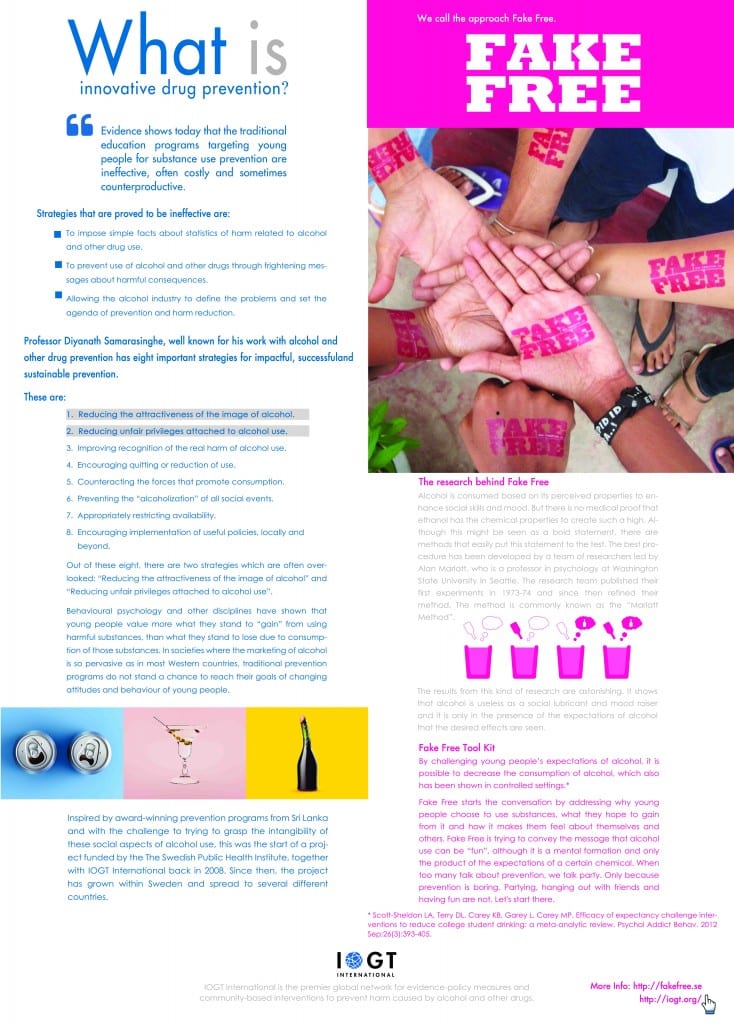I am now back from my adventures in Slovenia and the 6th European Society for Prevention Research (EUSPR) Conference, representing IOGT International and the Fake Free approach. It has been quite interesting; a lot of interesting seminars as well as some refreshing chats with the other participants.
So first and foremost: What have we contributed with on this conference?
We didn’t have the opportunity to present orally, instead we had a poster, like several other participants, to present the Fake Free approach.
And as always, Fake Free easily starts a lot of interesting conversations and blows a lot of minds, even among some of the leading people in the field of prevention. That is why I love the theories that Fake Free puts forward, together with the work done by ADIC in Sri Lanka, by CZOR in Serbia, CEM in Bosnia and IOGT Poland, and by researchers and practitioners like Diyanath Samarasinghe and Hans Olav Fekjaer; it’s so easily digested.
The idea of the drunken comportment as a social construction fills a lot of gaps in explaining intoxicated behaviour at the same time as it delivers an innovative idea in how we should communicate substance use prevention messages with adolescents. Though, a lot of people whom I met were critical to the fact that the ideas of Fake Free haven’t been tried out systematically. This is not exactly true since we know from before that ADIC and FISD have used this approach with great success in communities and among teenagers in Sri Lanka. We also know that challenging expectancies about alcohol and its effects among college student seems to have an impact on their attitudes and behaviours. Just the fact that organizations all over Europe, in Serbia, Poland and Slovakia are starting to implement the Fake Free approach says quite a lot of its applicability.
Although, within that critique lies a valid point. What exactly do we know about its implementation? Do we understand how different contexts and circumstances affect the approach? Could it be synergistic effects with other kinds of alcohol preventive approaches? Even though this might be seen as dull and extensive questions, they are important to ask. It’s important if we want legitimacy in the context of researchers but it is also important to ourselves; as a constant reminder on how we work to improve the work we are doing so we can reach out even more.
That brings me to the second question: What did we gain from being at this conference?
Though a lot of seminars were interesting in theory, I found it hard to see the direct applicability of research presented on the work we are doing. Either they were too in depth in theoretical framework regarding either research interventions or biological mechanisms or they were just to far from our field of work. The fact that most of the participants were academics of some sort obviously affected the discourse regarding what and how things were discussed. Only a few non-governmental organizations were present besides IOGT International. In a seminar called ”Plain-packaging: the roll of civil society against the tobacco industry” one of them talked about how the industry uses neuromarketing (a combination of neurology, psychology and economics) to target our subconscious minds for their profit purposes. This session focused on the tobacco industry as the title suggests but also used other industries, such as the soft drink industry, as an example of this practice. Big Alcohol wasn’t mentioned interestingly enough.
All in all, this was a great opportunity to meet people interested in multisectorial prevention practices and theories as well as more specific kinds of preventive work and research. Next year the 7th EUSPR conference might be held in Sweden, where I’ve been working to develop and implement the Fake Free approach. This would give us even more reason to come back. Hopefully we’ll come back with even more examples of how IOGT International and the Fake Free approach is changing lives all over the world.
